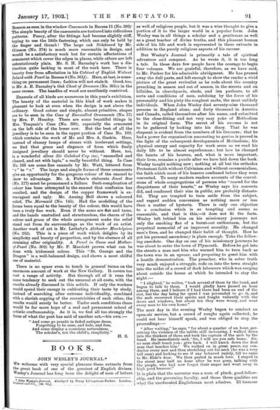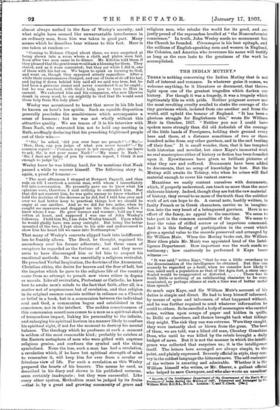BOOKS.
JOHN WESLEY'S JOURNAL.* WN welcome with very special pleasure these extracts from the great book of one of the greatest of English divines. Wesley's Journal has lOng been the delight of men of letters
• John Wosley's Journal. Abridged by Pere), Livingsteas Parker.. London
as well of religious people, but it was a wise thought to give a portion of it to the larger world in a popular form. John Wesley was in all things a scholar and a gentleman as well as a great teacher of divine truths, and this pleasant human side of his life and work is represented in these extracts in addition to the purely religious aspects of his carreer.
But Wesley's Journal is primarily a tale of spiritual adventure and conquest. As he wrote it, it is too long a tale. In these days few people have the courage to begin four volumes. We are grateful, therefore, as we have said, to Mr. Parker for his admirable abridgment. He has pruned away the dull parts, and left enough to show the reader a vivid picture of the great revivalist as he rode about the country preaching in season and out of season, in the streets and on hillsides, in churchyards, sheds, and inn parlours, to all sorts and conditions of men, subduing by the force of his personality and his piety the roughest mobs, the most unlikely individuals. When John Wesley died seventy-nine thousand persons in England alone, and forty thousand in America and Canada, called themselves after his name, and submitted to the close-fitting and not very easy yoke of Methodism in its original form. The secret of his success is not to be gathered by looking into his diary. That he was
eloquent is evident from the numbers of his listeners ; that he had a power for organisation amounting to genius is proved in the light of the subsequent developments of Methodism; his physical energy and capacity for work seem as we read his daily life to be almost superhuman ; but how he changed
the hearts of his hearers, and, what is more important, their lives, remains a puzzle after we have laid down the book.
Wesley taught nothing new ; nothing at all but the orthodox Protestant faith without Calvinism and without ceremonialism, the faith which most of his hearers confessed before they were converted. To many modern readers accounts of the convul- sions of whole congregations of persons who "roared for the disquietness of their hearts," as Wesley says his converts did, and confessed their sine in public, are probably distaste- fuL They are tempted to turn aside from the subject, and regard sudden conversion as nothing more or less than a matter of hysteria. There is only one objection to a conclusion which is so tempting and seems so reasonable, and that is this,—it does not fit the facts.
Wesley left behind him on his missionary journeys not only the smoking flax of a burnt-out enthusiasm, but the perpetual memorial of an improved morality. He changed men's lives, and he changed their habit of thought. How he got his personal asc,endenc: is plain enough. Take the follow- ing anecdote. One day on one of his missionary journeys he was about to enter the town of Plymouth. Before he got into the streets a man met him who warned him to turn back as the town was in an uproar, and preparing to greet him with a hostile demonstration. The preacher, who in sober truth very much enjoyed a struggle, rode on into the town straight into the midst of a crowd of dock labourers which was surging about outside the house at which he intended to stay the night :—
" I alighted," he writes, "took several of them by the hand, and began to talk to them. I would gladly have passed an hour among them, and I believe if I had there had been an end of the riot, but the day being far spent I was persuaded to go in, and the mob recovered their spirits and fought valiantly with the doors and windows, but about ten they were weary, and went every man to his own home."
The next day in the evening Wesley began to conduct an open-air service, but a crowd of roughs again collected; he could not hear himself speak, and was obliged to stop the proceedings :— "After waiting," he says, "for about a quarter of an hour, per- ceiving the violence of the rabble still increasing, I walked down into the thickest of them and took the captain of the mob by the hand. He immediately said,' Sir, I will see you safe home. Sir, no man shall touch you : give back. I will knock down the first
• man that touches him.' We walked on in great peace, my con- ductor every now and then stretching out his neck (he was a very tall man) and looking to see if any behaved rudely, till we came to Mr. Hide's door. We then parted in much love. I stayed in the street near half an hour after he was gone, talking with the people, who had now forgot their anger and went away in high good humour."
'It is plain that the narrator was a man of pluck, good-fellow- ship, and the governing faculty, and those three qualities are -what, the uneducated Englishman most admires. Ill humour
almost always melted in the face of Wesley's serenity, and what might have seemed like unwarrantable interference in an ordinary man, from him was taken in good part. Many scenes which he describes bear witness to this fact. Here is one taken at random :—
" Coming to Holmes Chapel about three, we were surprised at being shown into a room where a cloth and plates were laid. Soon after two men came in to dinner. Mr. Kitchin told them if they pleased that the gentleman would ask a blessing for them. They stared, and as it were consented; but they sat while I did it, one of them with his hat on. We began to speak on turning to God, and went on, though they appeared utterly regardless. After a while their countenances changed, and one of them stole off his hat, and laying it down behind him said all we said was true, but he bad been a grievous sinner and never considered it as he ought; but he was resolved, with God's help, now to turn to Him in earnest. We exhorted him and his companion, who now likewise drank in every word, to cry mightily to God that He would send them help from His holy place.'
Wesley was accustomed to boast that never in his life had he known an hour's low spirits. Such an equable disposition generally precludes the sensitiveness which accompanies a sense of humour ; but he was not wholly without this attractive quality. We see traces of it in his interview with Bean Nash, who entreated him not to hold any meeting in Bath, scoffingly declaring that his preaching frightened people out of their wits :— " Sir,' he asked, did you ever hear me preach ? No:—
6 How, then, can you judge of what you never heard?'—' By common report.'—' Common report is not enough; give me leave to ask, Sir, is not your name Nash name is Nash!— ' Sir, I dare not judge of you by common report, I think it not enough to judge by.' "
Wesley knew he was bitting hard, for he mentions that Nash paused a while to recover himself. The following story is, again, a proof of humour:—
" The next afternoon I stopped at Newport Pagnell, and then rode on till I overtook a serious man, with whom I immediately fell into conversation. He presently gave me to know what his opinions were, therefore I said nothing to contradict him. But that did not content him, he was quite uneasy to know whether I held the doctrine of the decrees as he did, but I told him over and over we had better keep to practical things lest we should be angry at one another. And so we did for two miles, when he caught me unawares and dragged me into the dispute before I knew where I was. He grew warmer and warmer; told me I was rotten at heart, and supposed I was one of John Wesley's followers. I told him No, I am John Wesley himself. Upon which he would gladly have run away outright. But being the better mounted of the two, I kept close to his side and endeavoured to show him his heart till we came into Northampton."
That many of Wesley's converts slipped back into indifferent- ism he frankly allows. The Devil, he thought, regained his ascendency over' his former adherents ; but these cases of
recapture he regarded as the fortune of war, and they never seem to have discouraged him or led him to suspect his
emotional methods. He was essentially a religious revivalist.
He preached Verbal Inspiration, the doctrine of the Atonement, Christian ethics, the desire for heaven and the fear of hell, but the impetus which be gave to the religious life of the country came from no attempt to preach new views either in dogma or morals. Like all revivalists, Protestant or Catholic, he knew how to awake men's minds to the fact that faith, after all, is a matter not of acquiescence but of revelation, and that religion in its original essence consists neither in reliance on a Church or belief in a book, but is a communion between the individual soul and God, a communion begun and established in the conscience, not in the intellect. The sudden consciousness of this communion sometimes comes to a man as a spiritual shock of tremendous impact, linking his personality to the infinite, and enlarging his spiritual horizon in a manner likely to confuse his spiritual sight, if not for the moment to destroy his mental balance. The theology which he professes at such a moment is seldom of the most reasonable kind ; probably he catches at the Eastern metaphors of men who were gifted with supreme religious genius, and confuses the symbol and the thing symbolised. None the less, such a man has had a revelation,
a revelation which, if he have but spiritual strength of mind to remember it, will keep him for ever from a secular or
frivolous view of life. For such a revelation as this Wesley prepared the hearts of his hearers. The means he used, as described in his diary and shown in his published sermons, seem certainly inadequate ; but they were successful. Like every other system, Methodism must be judged by its fruits —that is, by a great and growing community of grave and religious men, who rebuke the world for its good, and are justly proud of the reproaches levelled at "the Nonconformist conscience." In truth, John Wesley needs no monument but the Church he founded. Circumspice is his best epitaph, and the millions of English-speaking men and women in England,. the Colonies, and America who reverence his name will testify as long as the race lasts to the greatness of the work he accomplished.











































 Previous page
Previous page